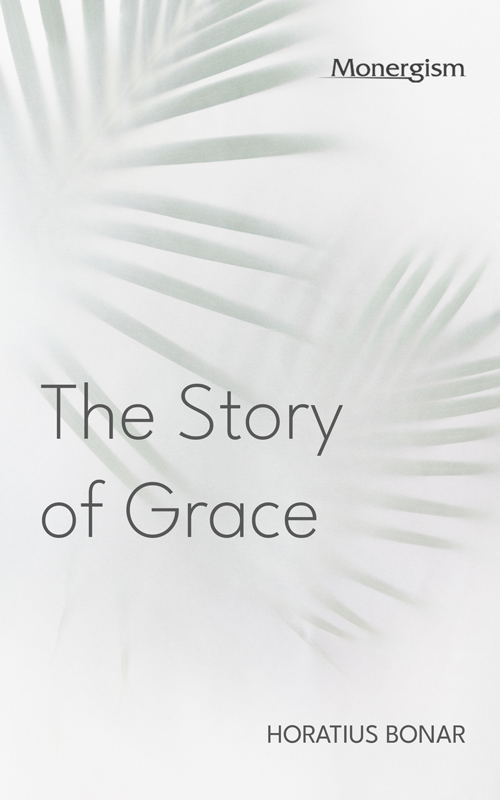 by Horatius Bonar
by Horatius Bonar
in ePub, .mobi & .pdf formats
I HAVE used the expression, "Story of Grace," which will be found to occur not only on the title-page but once and again throughout this volume, not so much because of its simplicity, as because it seemed to me the exactest for bringing out the real nature of THE GOSPEL, and for helping us to shake off from it the misconceptions which self-righteousness has in so many forms hung around it, defacing its comeliness and clouding its sunshine. God meant the Gospel to be not so much a profession of love as a visible exhibition of it; not so much a declaration of feeling as a history of facts. His object is not so much to address us in words that may be heard, as in deeds which may be seen and felt.
He knew that it is not enough for him to say to us that he is gracious; the reiteration of this truth, however frequent and fervent, would not suffice. He who fashioned our natures knew that it is not thus that hearts are won. If he would find his way into them once more, he must display as well as declare his grace.
Mere professions of love do often only harden us against its influence, closing the ear that they are meant to open; for it is so easy to use the warm language of love, even when love itself is cold. The heart may he emptiest when the voice is loudest; and we are ready enough to value but slightly what costs nothing but words. Besides, what comes to us indirectly, and by inferences of our own, from clear facts and deeds, is more powerful than what reaches us more directly. We delight far more in gathering up the broken fragments of affection as they silently scatter themselves along the course of some artless story, than in listening to the most fervent exclamations and asseverations of love.
Therefore it is that He who formed our natures has taken this way of reaching and winning them. It is thus that he steals round them with gentle attractiveness, that, ere we are aware, our hearts may be led captive and bound in the fetters of his love. He has embodied his love in deeds, and given us the story of what he has done and of what he means to do. He does not come up to us directly and say, "I love you," but he does the loving deed: he brings to pass the gracious event; and thus there is suggested to us, with irresistible impressiveness, the thought, "Oh, how he loves!"
It has been said of human affection, that it has no need of language to give it utterance.
The look can convey the feeling better than the word, and "eye can well interpret eye." If, then, the look and the eye be so intensely expressive, how much more the deed?
Thus it is with God. He does the loving deed, and then records it in all its simplicity, without one word of colouring or comment. He does the gracious thing, and then writes down the story of it, that we may read in it the riches of his grace, and that, in thus reading, we may blessed.
That story is the simple record of love's doings in behalf of the beloved object. In regard to these doings there can be no mistake. They do not admit of a double interpretation; they do not leave us in any doubt as to the gracious mind of the doer. They make it plain; indeed, plainer even than words or affirmations. Besides, they are more winning and more irresistible; they are facts which can have but one meaning—facts which can lead but to one conclusion, a conclusion such as that which the Apostle drew when he said,
"Hereby perceive we the love of God, BECAUSE HE LAID DOWN HIS LIFE FOR US." (1 John 3:16) The story of grace, then, is the story of God's doings in grace with this world of ours. If we speak of it in reference to the Father, it is the story of his thoughts and purposes from eternity. And what grace there is in these!
If in reference to the Son, it is the story of his doings and sufferings upon earth. And what grace there is in these! If in reference to the Spirit, it is the story of his witness-bearing to this manifested grace of Godhead. For he is the narrator of the wondrous tale! Thus the loving purposes are the purposes of the Father, the loving deeds are the deeds of God the Son, and the loving testimony is the testimony of God the Holy Ghost. The story of grace is the truest that has ever been told on earth. He who tells it is true, and he of whom it is told is the same. In it there is no intermixture of the true and the false; it is absolutely and altogether true, in every jot and tittle. Only this may he said of it, that whilst it is "a true report which we have heard," (1 Kings 10:6) yet the half has not been told us.
Nothing so wonderful has ever been wrought out of man's fancy or drawn out of human history. It is "stranger than fiction." Yet all is simplicity. No colouring of art is laid on for the sake of attractiveness; Scripture always taking for granted that the real can never be indebted to the unreal for interest or effect.
Nor is it more marvellous than blessed. It contains God's own proposals of friendship to us. It speaks of peace,—a purchased, finished peace, through a divine peace-maker,—
peace between the sinner and God, between earth and heaven. It points to rest, rest for weary man. Its object is to fill us with God's own joy, to make us sharers of God's own blessedness. In listening to it we find the burden of our guilt unfastening itself from our shoulders, and the bondage of a troubled conscience giving place to the liberty of reconciliation and love.It is a story of the heart. And the heart whose feelings it transcribes, whose treasures it unlocks, is the heart of GOD.
It is this story of grace that has brought back something like sunshine into this world of ours. For though light has not yet displaced the darkness, still it is no longer midnight.
"Through the tender mercy of our God, the day-spring from on high hath visited us, to give light to them that sit in darkness and in the shadow of death, to guide our feet into the way of peace." (Luke 1:7-8) Morn still lingers, as if struggling with prolonged twilight, or as if the sun were rising under an eclipse: but the promise of day is sure; the noon is near.
It is this story of love that has shed peace into so many souls, and unburdened so many consciences of their loads of guilt. Many a wound has it healed; many a broken heart has it upbound; many a feeble limb has it strengthened; many a careworn brow has it
unwrinkled; many a dim eye has it re-kindled. It has gladdened earth's melancholy wastes as with fresh fragrance and verdure, sadly reminding us of the paradise we have lost, yet brightly pledging to us the hope of the better paradise hereafter, when, under the dominion of the second Adam, the desert shall rejoice and blossom as the rose.
It is this story of love that God has been telling for these six thousand years. He calls it "the Gospel," or the good news, or the glad tidings of great joy. And so it is. Yet how few receive it as such, or give God the credit for speaking the truth when he makes that Gospel known to us! "Who hath believed our report? and to whom is the arm of the Lord revealed?"
I have sought in this volume to open up a part of this wondrous story,—that part of it which God made known to our first parents. In this fragment, we may be said to have the outline of the whole. It was told partly in Eden and partly out of it; partly before "he drove out the man," and partly afterwards. Both of these scenes I have endeavored to sketch.
I have written generally for all classes and ages; but I confess I have often, throughout, found my eye turning to the youth of our day,—to those who in the pride of opening manhood and womanhood are hewing out, each one his own cistern, to be broken as soon as hewn, and eagerly asking, "Who will show us any good?"
Many of these are ensnared with the fascinations of a present evil world. Its cup tastes sweet to them, and they would fain prolong the draught. The "lust of the flesh, the lust of the eyes, and the pride of life," are leading them far astray. Life seems to open on them like a summer's dawn. They hurry along, eager, to enjoy its brightness, and impatient of every obstruction that besets their path. Perhaps the thirst of gold has already seized them, sealing up their hearts against all that is large, and loving, and holy. Or, perhaps, it is the delusion of romance that dazzles. Earth, with its tales or dreams of love; earth, with its music and mirth; earth, with its poetry and song; it is this—it is this that is seducing the soul and ensnaring the opening affections. They drink into the sentiment in which one of the poets of modern pantheism exults:
"High swells the joyous bosom, seeming
Too narrow for its world of love;
Nor envies in its heaven of dreaming
The heaven of gods above!"
No wonder that it should be hard to win their hearts to God, or draw their ear to listen to his voice. The very name of religion seems to chill them, sometimes to irritate them.
But shall we allow them thus to waste their immortal being, to feed their famished souls upon the world's husks or the world's poison? Shall we not tell them how sadly they mistake when they fancy that there is joy only in that gay world of pleasure? There is such a thing as joy elsewhere, joy purer and sweeter than they have ever tasted. There is love, deeper, truer far than that of earth. There is a tale of love to which earth's highest stretch of romance can make no approach. It is to this tale of infinite love that we would invite their ear.
It is one which runs through many ages, opening and widening as it passes along. I have tried to lay hold of it at a single point, when emerging in its brightness from the shadows which man's sin had drawn over the earth. To trace it in its after-progress, as told by patriarchs, and prophets, and apostles, and above all, as proclaimed by Him who was in the bosom of the Father, and who came down to tell us of the grace that is there, would far overstretch the limits of this slender volume. But the theme is too full and rich not to invite a return to it, if such be the will of God.
-----
Table of Contents
Preface
How God Told the Story of Goodness in Eden
How Man Interupted the Story
How God Overruled Man's Interuption
God's Purpose Unfolding Itself
How the Story of Grace Began
Where the Story of Grace Was First Told
By Whom the Story Was Told
The Outline of the Story
The Conqueror
The Banished One
The Monument
The Guard
The Two Worshippers
